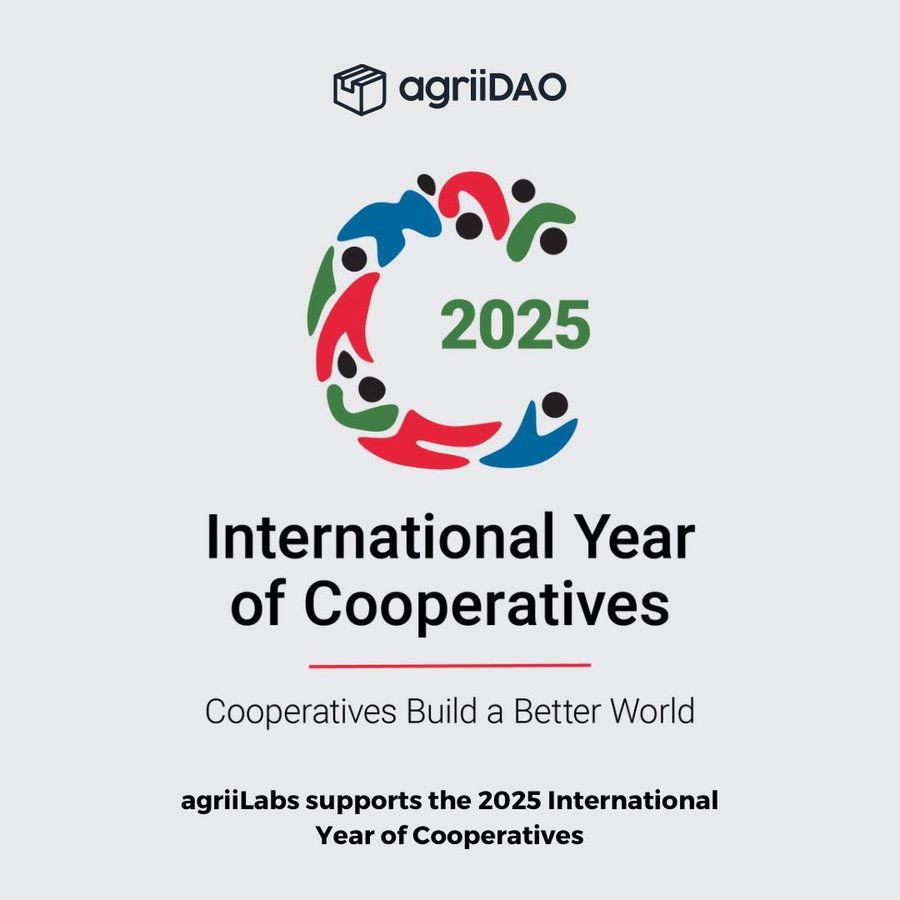AgriiDAO just secured the official stamp of approval to carry the International Year of Cooperatives 2025 logo, aligning itself with a global initiative declared by the UN. This isn’t just another badge; it’s a signal that decentralised organisations are stepping into the spotlight as serious players in shaping fairer and more sustainable economic systems. Cooperatives have been around for ages, built on shared ownership and collective decision-making. Web3 takes those principles and strips away inefficiencies, replacing them with smart contracts, tokenomics, and community-driven governance.

Traditional food systems aren’t collapsing under their own weight; they’re lagging behind in an era that demands better transparency, efficiency, and inclusivity. AgriiDAO is making the case that the solution isn’t tearing it all down but modernising the infrastructure. Supply chains built on centralised control tend to struggle with waste, inequity, and opacity. Cooperative models bring collective bargaining power and localised decision-making, but without the right tools, they can still fall prey to inefficiencies.
Decentralised Autonomous Organisations (DAOs) are often dismissed as experimental, but they operate on the same fundamental principles as co-ops. The difference? DAOs eliminate the need for cumbersome bureaucracy, making governance more transparent and tamper-proof. AgriiDAO is leaning into that approach, giving agricultural cooperatives a Web3-powered upgrade that ensures fairer pricing, real-time tracking, and direct engagement between producers and consumers. By plugging co-ops into blockchain infrastructure, middlemen lose their grip, and the system becomes more responsive to actual needs rather than top-down dictates.
Technology alone doesn’t fix broken systems, but it does offer tools that can make them work better. Farmers dealing with opaque supply chains and fluctuating market conditions often end up at the losing end of negotiations. Blockchain-based transparency allows them to verify transactions, track produce from farm to table, and get fairer deals without layers of intermediaries siphoning off profits. Tokenised incentives can also ensure that sustainable farming practices are rewarded rather than sidelined by profit-driven priorities.
The International Year of Cooperatives 2025 puts a spotlight on models that promote equity and inclusion. AgriiDAO’s role in that conversation isn’t just about riding the wave of Web3 hype; it’s about demonstrating that blockchain-backed cooperatives can deliver real-world impact. Whether it’s ensuring small farmers aren’t underpaid or giving consumers a clearer picture of where their food comes from, the shift isn’t theoretical. It’s happening.
Scepticism towards blockchain in agriculture often centres on complexity and accessibility. Not every farmer is going to deep-dive into smart contracts or tokenomics, nor should they have to. The key lies in building tools that integrate seamlessly with existing workflows while offering clear benefits. Mobile-first interfaces, automated compliance mechanisms, and simplified staking models can bridge that gap, ensuring that participation doesn’t require technical expertise.
Food security conversations often focus on yield, climate resilience, and geopolitics, but financial structures underpinning the industry deserve just as much attention. If pricing mechanisms remain opaque and monopolistic, supply-side solutions alone won’t fix underlying disparities. Decentralised governance ensures that those who produce food have more say in how it’s priced and distributed, rather than being dictated to by corporations or market speculators.
DAOs don’t guarantee utopia, but they shift power dynamics in ways that conventional models struggle to replicate. Unlike traditional cooperatives that rely on elected boards and periodic meetings, blockchain-powered governance allows for continuous, tamper-proof participation. Smart contracts execute decisions automatically based on pre-agreed terms, reducing human bias and administrative bottlenecks. That doesn’t mean every challenge disappears, but it does mean there’s less room for arbitrary decision-making and more room for direct accountability.
The adoption curve for blockchain in agriculture won’t be instant. Legacy systems are deeply entrenched, and resistance to change is expected. The difference now is that the inefficiencies are becoming harder to ignore. As supply chain disruptions, price volatility, and resource scarcity intensify, solutions that were once seen as radical become pragmatic. AgriiDAO’s endorsement under the International Year of Cooperatives banner signals that these ideas are gaining legitimacy beyond niche crypto circles.
Regulation remains a key hurdle. Many blockchain-based initiatives struggle with compliance uncertainties, especially when dealing with cross-border transactions and varying legal frameworks. That’s why partnerships with institutions matter. AgriiDAO’s recognition within the cooperative movement could act as a bridge, making it easier to work within regulatory frameworks rather than constantly battling them. Collaboration between decentralised and traditional models isn’t a contradiction; it’s an opportunity to refine governance structures that balance autonomy with accountability.
At its core, the conversation isn’t about replacing co-ops with DAOs. It’s about making cooperatives work better by removing inefficiencies that have historically held them back. Whether through tokenised incentives, smart contract-driven governance, or transparent pricing mechanisms, the shift towards blockchain-powered cooperatives isn’t speculative. It’s already happening in pockets around the world. The question isn’t whether this transformation is necessary, but how quickly and effectively it can scale.
AgriiDAO’s recognition under the UN-backed initiative sends a clear message: decentralised cooperation isn’t an abstract concept; it’s a viable, scalable alternative to outdated economic structures. Food systems don’t need to be rebuilt from scratch. They just need an upgrade.


